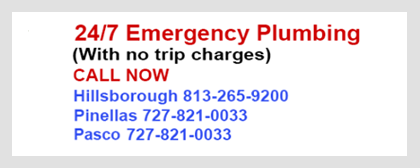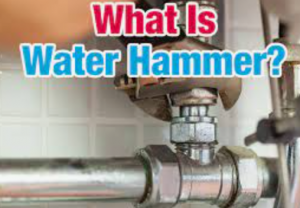 Water hammer is a common plumbing issue throughout the Tampa, Florida area that often goes unnoticed or misunderstood by Tampa homeowners. In this comprehensive guide, we will delve deep into the causes, effects, and solutions for water hammering, ensuring you have all the necessary information to tackle this common plumbing problem.
Water hammer is a common plumbing issue throughout the Tampa, Florida area that often goes unnoticed or misunderstood by Tampa homeowners. In this comprehensive guide, we will delve deep into the causes, effects, and solutions for water hammering, ensuring you have all the necessary information to tackle this common plumbing problem.
Understanding Water Hammer: Definition and Causes
Water hammer, also known in plumbing as hydraulic shock, is a phenomenon that occurs when a sudden change in water flow causes a pressure surge within the plumbing system. This abrupt shift can create a loud, banging, or knocking noise and potentially lead to significant damage if left untreated. The primary causes of water hammer are:
- Sudden valve closures: When valves are closed suddenly, the rapid halt in water flow can cause a pressure wave to travel through the pipes, resulting in water hammer.
- High water pressure: Elevated water pressure in the plumbing system can exacerbate the impact of water hammer and increase the risk of damage.
- Pump starts and stops: The sudden starting or stopping of water pumps can create rapid changes in water flow, leading to water hammer.
The Consequences of Water Hammer
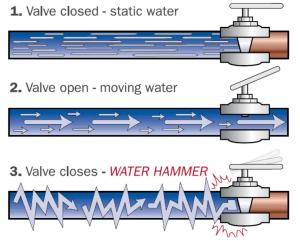 The effects of water hammer can range from minor annoyances to significant damage, depending on the severity of the issue. Some of the most common consequences include:
The effects of water hammer can range from minor annoyances to significant damage, depending on the severity of the issue. Some of the most common consequences include:
- Noise: The most apparent sign of water hammer is the loud banging or knocking sound that accompanies pressure surges in the pipes.
- Vibration: The pressure waves created by water hammer can cause pipes to vibrate or shake, potentially leading to damage or disconnection.
- Pipe damage: Over time, the repeated pressure surges associated with water hammer can weaken or rupture pipes, leading to leaks or more severe damage.
- Fittings and fixture damage: The pressure surges can also damage fittings and fixtures, such as valves and faucets, resulting in costly repairs or replacements.
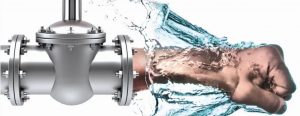 How to Diagnose Water Hammer
How to Diagnose Water Hammer
Diagnosing water hammer typically involves the following steps:
- Identify the source: Begin by pinpointing the source of the noise or vibration. Pay close attention to areas around valves, faucets, and appliances that use water, such as washing machines and dishwashers.
- Check for loose pipes: Inspect your plumbing system for loose or improperly secured pipes, as these can exacerbate water hammer issues.
- Monitor water pressure: Use a water pressure gauge to determine if your home’s water pressure is within the recommended range of 40-60 psi. High water pressure can intensify water hammer effects.
Step-by-Step Guide to Fixing Water Hammer

Examples of Plumbing Damaged by Water Hammer
To fix water hammer issues, follow these steps:
- Secure loose pipes: Ensure that all pipes are properly secured with pipe straps or hangers, minimizing movement and vibration.
- Install water hammer arrestors: These devices are designed to absorb pressure surges and can be installed near the source of the water hammer, such as at the valve or appliance connection. 3. Adjust water pressure: If your home’s water pressure is too high, consider installing a pressure reducing valve (PRV) to regulate and maintain the pressure within the recommended range.
- Slow down valve closures: For manual valves, close them slowly to avoid sudden changes in water flow. For automatic valves, consider installing slow-closing solenoid valves or installing flow restrictors to mitigate the effects of water hammer.
- Inspect and maintain water pumps: Regularly inspect and maintain water pumps to ensure they are operating efficiently and not contributing to water hammer issues.
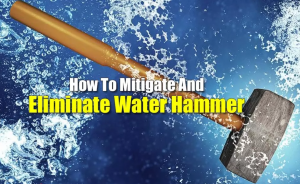 Preventive Measures for Water Hammer
Preventive Measures for Water Hammer
To prevent water hammer issues from arising in the first place, consider implementing these preventive measures:
- Proper pipe sizing: Ensure that your plumbing system utilizes pipes of appropriate size to minimize the risk of pressure surges.
- Air chambers: Installing air chambers or cushioning devices can help to absorb pressure fluctuations and prevent water hammer.
- Regular maintenance: Conduct regular maintenance and inspections of your plumbing system to identify and address potential issues before they escalate.
When to Call Cass Plumbing
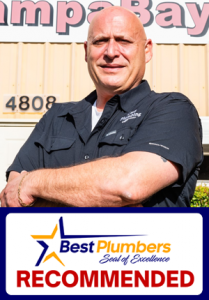 While some water hammer issues can be resolved through DIY methods, it’s crucial to know when to call in a professional plumber like Cass Plumbing for help if:
While some water hammer issues can be resolved through DIY methods, it’s crucial to know when to call in a professional plumber like Cass Plumbing for help if:
- The issue persists: If water hammer continues even after attempting the solutions mentioned above, a plumber can help identify and address the underlying cause.
- Damage is evident: If you notice damaged pipes, fittings, or fixtures, it’s best to call a plumber to assess the situation and recommend appropriate repairs or replacements.
- Water pressure issues: If you’re unsure about how to adjust your home’s water pressure or install a PRV, a professional plumber can assist in ensuring your plumbing system operates efficiently and safely.
By understanding the causes, effects, and solutions for water hammer, you can effectively address this common plumbing issue and protect your home from potential damage. Remember to implement preventive measures and seek professional help when necessary to keep your plumbing system in optimal condition.
Selecting the Right Materials for Your Plumbing System
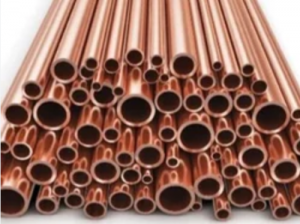 The choice of materials for your plumbing system plays a crucial role in preventing water hammer and ensuring the system’s longevity. Here are some essential considerations when selecting plumbing materials:
The choice of materials for your plumbing system plays a crucial role in preventing water hammer and ensuring the system’s longevity. Here are some essential considerations when selecting plumbing materials:
- Pipe material: Common pipe materials include copper, PEX, CPVC, and PVC. Each material has its own set of advantages and disadvantages. For instance, copper is durable and has a long lifespan but can be more expensive, while PEX is flexible and more affordable but may be less resistant to UV light.
- Pipe thickness: Thicker pipes can better withstand pressure surges associated with water hammer. When selecting pipe thickness, consider factors such as water pressure, pipe material, and local building codes.
- Fittings and connections: Choose high-quality fittings and connections that are compatible with your chosen pipe material. Durable and reliable fittings help minimize the risk of leaks and damage caused by water hammer.
Periodic Plumbing System Inspection and Maintenance
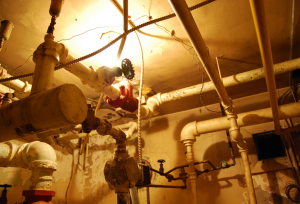 Regular inspections and maintenance of your plumbing system by a Tampa professional plumber like Cass Plumbing can help identify potential water hammer issues before they become severe problems. Here are some key aspects to consider when conducting routine plumbing inspections:
Regular inspections and maintenance of your plumbing system by a Tampa professional plumber like Cass Plumbing can help identify potential water hammer issues before they become severe problems. Here are some key aspects to consider when conducting routine plumbing inspections:
- Check for leaks: Inspect your plumbing system for signs of leaks, such as water stains, mold, or dampness. Early detection and repair of leaks can prevent more significant damage and help maintain optimal water pressure.
- Inspect valves: Regularly check the condition of your plumbing system’s valves. Look for signs of wear, corrosion, or damage that could lead to water hammer or other issues.
- Monitor water pressure: Regularly check your home’s water pressure using a pressure gauge. Ensure it remains within the recommended range of 40-60 psi to reduce the risk of water hammer and other plumbing problems.
- Water heater maintenance: Regularly flush your water heater to remove sediment buildup, which can cause pressure fluctuations and contribute to water hammer issues.
By implementing a consistent inspection and maintenance schedule, you can keep your plumbing system in optimal condition and minimize the risk of water hammer and other plumbing issues.
Water hammer is a common plumbing problem that can cause significant damage if left untreated. Understanding the causes, effects, and solutions for water hammer is essential for homeowners to maintain a safe and efficient plumbing system. Regular maintenance, appropriate material selection, and preventive measures can help you avoid water hammer issues and protect your home from potential damage. If you encounter persistent or severe water hammer problems, don’t hesitate to seek the assistance of a professional plumber to ensure your plumbing system remains in top condition.
When You Want To Solve Your Water Hammer Issues Fast, Call Cass!
When it comes to choosing a Tampa plumber that can fix your water hammer issue, there are a few factors to consider. The reputation, experience, and customer satisfaction of the plumbing company are essential. In the Tampa Bay area, Cass Plumbing stands out as the ideal choice for water hammering issues in your plumbing, thanks to its outstanding track record and credentials. Here’s what makes Cass Plumbing the preferred choice for water hammer services:
 Extensive experience: Cass Plumbing has been repiping Tampa homes and businesses for over 20 years, which means they have the knowledge and skills to handle even the most challenging water hammer projects.
Extensive experience: Cass Plumbing has been repiping Tampa homes and businesses for over 20 years, which means they have the knowledge and skills to handle even the most challenging water hammer projects.- Excellent reputation: Cass Plumbing is the recommended repipe expert by Best Plumbers, the #1 plumbing directory on the Internet. This recognition speaks to their expertise and quality of work.
- A+ rating from the Tampa Bay Better Business Bureau: This rating highlights Cass Plumbing’s commitment to customer satisfaction and ethical business practices.
- Over a thousand 5-star reviews online: Satisfied customers have left numerous positive reviews, attesting to the quality of Cass Plumbing’s services and their dedication to providing top-notch results.
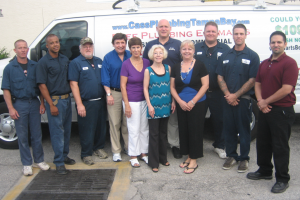 Repiping is a crucial investment for homeowners and business owners to ensure the safety and efficiency of their plumbing systems. It’s important to work with a trusted and experienced company to guarantee a successful repiping project. Cass Plumbing is the premier choice for repiping services in the Tampa Bay area, with an impressive track record, exceptional customer service, and the expertise needed to handle any repiping project.
Repiping is a crucial investment for homeowners and business owners to ensure the safety and efficiency of their plumbing systems. It’s important to work with a trusted and experienced company to guarantee a successful repiping project. Cass Plumbing is the premier choice for repiping services in the Tampa Bay area, with an impressive track record, exceptional customer service, and the expertise needed to handle any repiping project.
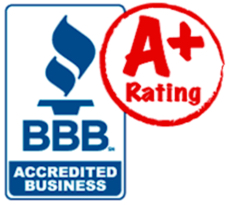 When you need to repipe your home or commercial building, trust the experts at Cass Plumbing. Their outstanding reputation, extensive experience, and commitment to customer satisfaction make them the best choice for all your repiping needs in Tampa Bay. Contact Cass Plumbing today to discuss your repiping project and discover the difference that working with the best in the industry can make.
When you need to repipe your home or commercial building, trust the experts at Cass Plumbing. Their outstanding reputation, extensive experience, and commitment to customer satisfaction make them the best choice for all your repiping needs in Tampa Bay. Contact Cass Plumbing today to discuss your repiping project and discover the difference that working with the best in the industry can make.



